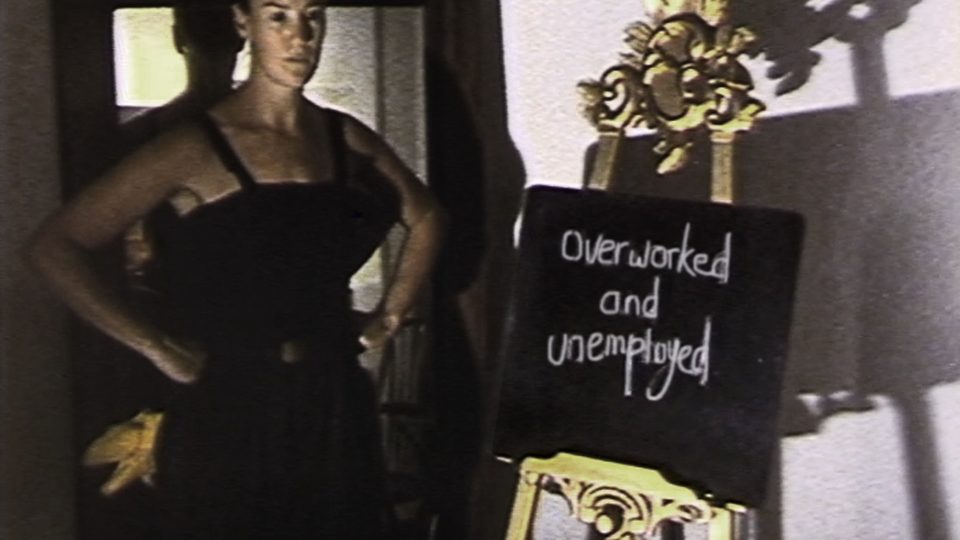
Tommy Oliver’s 40 Years a Prisoner and Ephraim Asili’s The Inheritance, which both premiered at TIFF, in the Documentary and Wavelengths sections, center on the Black American revolutionary experience. Both films use rich archival footage, albeit deployed differently, in a more straightforward testimonial way in Oliver’s film, and more explorative, fluid manner in Asili’s feature, the latter a mixture of reenactments of Asili’s past personal experience, plus scripted and improvised fictional vignettes, poetry, song and performance, and, finally, contextualizing archival material.
Watching these two films side by side, using, at least in one instance, the same archival clip, made me reflect how experimental film can push beyond accruing of historical facts, or balancing of perspectives, to an amalgam that’s didactic yet playful — and amounts to knowledge rooted in subjectivity.
The Black radical collective, MOVE, founded in Philadelphia by the activist and thinker John Africa, which has been functioning since the 1970s, is at the heart of 40 Years a Prisoner. The film is anchored in the first-person perspective of Michael Africa Jr., who, at the point when we meet him, is battling the American justice system to get both of his parents, Debbie and Michael Africa, released from prison. “I’ve been going to prison for 38 years,” Michael Jr. tells us, as we first accompany him on his habitual ride to jail.
The story unfolds simultaneously as an exploration of past and present — there’s the past of the MOVE collective, presented through interviews and archival footage, and then there’s the ongoing battle of Michael Jr. and his parents, with the help of lawyers and activists. 40 Years a Prisoner will screen on HBO, and no doubt, as a documentary that reaches a wide audience, it will be an important viewing. And yet, it left me with a lingering sense of thirst: What was the radicalness of Africa’s teachings? The talking heads in Oliver’s film lean heavily towards a rounded exposition, and as such, also towards showing MOVE as a cult. There are sporadic mentions of green life, which will register with vegan and organic-minded viewers, but also of poor hygiene, general concerns of neighbors for safety, malnourishment of children, mentions of threats, emphasis on combat, reports of belligerent behavior. More than once, a white journalist frames MOVE participants as brainwashed earnest victims, and although the use of police force against the collective is so clearly criminal and atrocious, the emphasis somehow lingers on the fact that MOVE members were alienated, and misguided, at best. It is perhaps then no wonder that we get so invested in Michael Jr.’s personal quest, because, on one hand, it’s absolutely moving and daunting, but, on the other, it sidetracks us from any philosophical, political, activist considerations of MOVE itself. You’ll need to reach beyond the film to understand more fully that this could not have been Michael Jr.’s intention, based on his own testimony.
Personal is not political, in this sense. Personal pacifies. To get unstuck from this sense of a fundamental gap — shunting ideas to the background, while their dire consequences take predominant stand, no matter how important the context of the difficulties surrounding the couple’s release — one needs to watch Asili’s The Inheritance. The latter film isn’t so much a didactic, or treatise-like exploration of Africa and MOVE’s teachings, but rather a twofold negotiation of what it was like for Asili to have lived the Black radical experience (in 2000s), participated in a commune, thought of natural living. I was struck by how, for example, Asili uses the same clip of the pregnant Debbie Africa boxing in the commune’s backyard, without this image registering necessarily as a straightforward indoctrination into militancy, but rather a manifestation of putting ideas into daily praxis.
To marry thought and life is no small thing. Asili applies a framework from Godard’s La Chinoise (1967), a touch of Brechtian theater: it syncretizes experience, and provides some analytical estrangement. Asili’s actors slip seamlessly in and out their roles, as willing revolutionaries in training, and their own young selves. But to call this “theater” doesn’t quite convey the freshness of Asili’s approach. In scenes, in which the collective members read texts aloud or declaim them, as a theater of ideas, there is a sense in which one might recover the beating pulse of a thinker such as Africa — in other words, distill the idea as a tool for thinking, organizing, being. Perhaps then the word “inheritance” points to this possibility of unearthing and recuperating, an archeology of Black radical thought. While both films introduce MOVE, The Inheritance searches for its relevance , perhaps even necessity, in our own disjointed, isolated, individualist world, which nevertheless feels somehow ripe for change.
For more coverage of TIFF, also see our posts on Miwa Nishikawa and Malgorzata Szumowska and Emma Seligman.

